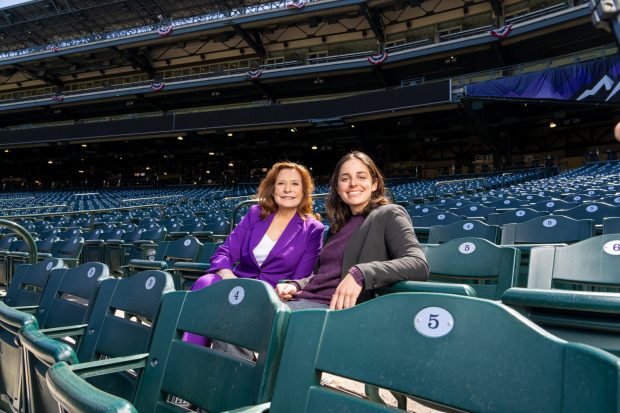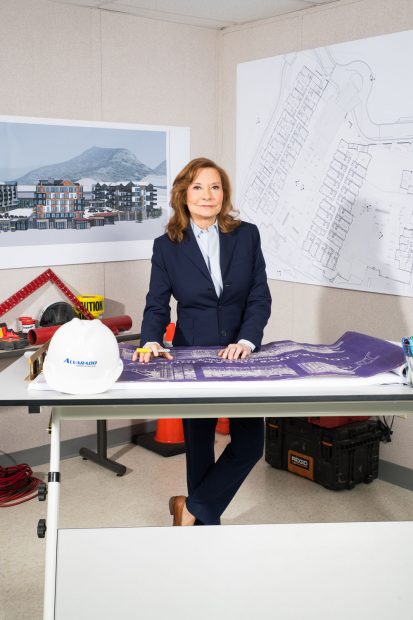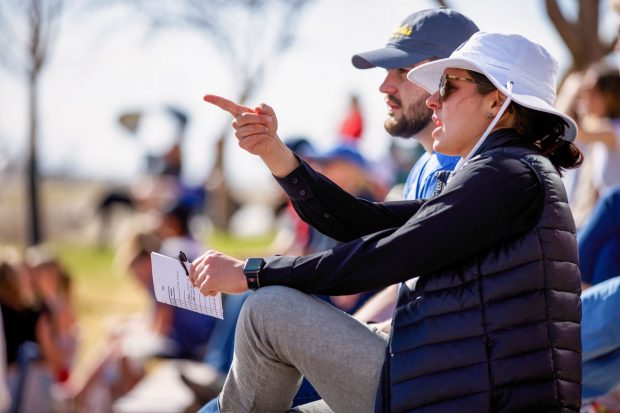 It’s midday at the Colorado Rockies’ Coors Field, still hours before first pitch. A couple of groundskeepers are busy mowing the grass with practiced precision, and another is spraying the infield dirt with a fine mist before the evening’s game.
It’s midday at the Colorado Rockies’ Coors Field, still hours before first pitch. A couple of groundskeepers are busy mowing the grass with practiced precision, and another is spraying the infield dirt with a fine mist before the evening’s game.
High above the field, Linda Alvarado ’73 and Emily Glass ’15 sit in a quiet stadium lounge that soon will be buzzing with fans. They have little and yet worlds in common.
Alvarado is a self-made construction mogul with a net worth Forbes estimates at $230 million. The founder, president and CEO of Alvarado Construction, a large commercial general contractor, she became the first Latino owner in Major League Baseball history—and a woman who didn’t inherit her stake at that—as part of the ownership group that won an expansion bid for a new National League team in 1991 and brought the Colorado Rockies to Denver in 1993.
Glass is a new employee, only months on the job, digging her fingernails deeper into a career in baseball after being hired as the Rockies’ first female scout last November. Like Alvarado, she has gotten where she is with intelligence, a clever knack for finding her way around obstacles and a sense of humor that has served both women well in male-dominated fields. Besides the Rockies and a love for baseball, they have one other thing in common: Pomona College.
“What dorm did you live in?” Glass asks.
“I think I lived in Mudd,” Alvarado says, reaching back over the years.
“I lived in Mudd too!” Glass says.
“You’re kidding.”
“No. Mudd 2 back. Did you go up the stairs?”
“I think so.”
“Mudd 2! Let’s go!” Glass says as they exchange one of the fist bumps that punctuate their conversation.
Though Alvarado learned about Glass’s baseball background during the scouting search and from former Rockies manager Clint Hurdle before she was hired, the pair didn’t discover their Pomona connection until well after Glass had started working for Marc Gustafson, the Rockies’ senior director of scouting operations, and been featured in the Denver Post.

Rockies co-owner Linda Alvarado ’73, left,
and scout Emily Glass ’15 in the stands at Coors Field.
Glass isn’t the only woman working as a scout for a major league team, and the so-called glass ceiling in baseball’s front offices already has been broken by Miami Marlins General Manager Kim Ng, who became MLB’s first female GM in 2020. But Glass, who serves as the Rockies’ scouting operations administrator in addition to scouring Colorado and beyond for amateur talent, is still part of the early wave of women in baseball. She’s someone with a “very bright future” as Gustafson told the Post after Glass emerged as one of the standouts from the MLB Diversity Pipeline Scout Development Program in Arizona last fall.
Alvarado and Glass followed very different paths to Pomona and had very different experiences.
Growing up in New Mexico, Alvarado shared a two-room adobe home with her parents and five brothers. “Not two bedrooms,” she says. “Two rooms.” The captain of her high school softball team, she turned down an opportunity to play college ball in the Midwest to attend Pomona on an academic scholarship.
Glass grew up in Northern California in what she describes as a University of California family. Her parents and brother earned degrees at various UCs, and her parents met in Berkeley. She played softball for two years at Pomona before quitting to play hardball with the guys in a beer league.
“A beer league? How come they didn’t have that when I was there?” Alvarado says. “My era was free love, you know. Burn your bras, and I was there when they first had Earth Day.”
MLB’s First Latino Owner
 Alvarado’s girlhood was steeped in sports. “My parents didn’t embrace conventional thinking, particularly for Hispanic families, to let this girl be out there playing baseball with the boys, getting dirty, getting punched,” says Alvarado, born Linda Martinez. Her father was a catcher in summer baseball leagues, so she played catcher like him. “He would let me go clean the plate between innings—which is still the only plate I know how to clean,” she says with characteristic wit.
Alvarado’s girlhood was steeped in sports. “My parents didn’t embrace conventional thinking, particularly for Hispanic families, to let this girl be out there playing baseball with the boys, getting dirty, getting punched,” says Alvarado, born Linda Martinez. Her father was a catcher in summer baseball leagues, so she played catcher like him. “He would let me go clean the plate between innings—which is still the only plate I know how to clean,” she says with characteristic wit.
Throw in the fact that Alvarado’s first date with her future husband, Robert Alvarado, was at Dodger Stadium, and it’s clear that bringing an MLB team to Denver was more than an investment decision, though it has been a good one for Alvarado, the only woman in the ownership group that acquired the team for a $95 million expansion fee and startup costs. Today, Forbes values the Rockies at $1.385 billion, with majority owners Dick and Charlie Monfort helming a current group of four limited partners, including Alvarado.
Her involvement began with a phone call from then-Gov. Roy Romer in the early 1990s, asking her to meet him for breakfast at the Brown Palace, Denver’s iconic downtown hotel. “He didn’t call my husband,” Alvarado makes it clear, even though Robert is her partner in Palo Alto, Inc., a separate empire that operates more than 250 YUM! Brands franchise restaurants, many of them Taco Bells.
“I thought Gov. Romer was going to ask me for a political contribution,” she says. Instead he was asking her, as an entrepreneur, to consider joining a group of men working to put together a viable bid for a new MLB team. “There was no major league team between Kansas City and Los Angeles,” she says. “Colorado had been trying to get a team for years and years and years.”
Getting Alvarado on board strengthened the bid with her business experience, active involvement in civic and community leadership, and because Bill White, the National League president at the time, and MLB had emphasized diversity in ownership as an important factor. Besides writing a big check, the effort required determination and persistence, two qualities Alvarado has in abundance, and a willingness to take a big risk.
“It’s not like when you put a deposit down on a car, you don’t get the car, you get your money back,” she says. “Putting together a proposal like this is very challenging and costly. A lot of the questions they’re going to have before you even get considered for the short list: Are you committed? Are you aligned with the City? Are you going to be able to deliver success on the field and fill the stands, or is this an investment so you can be on the front page?”
A critical selection requirement was building a major league stadium, and the ownership group campaigned hard to pass a six-county sales tax referendum to fund construction of a new stadium. As the classic brick facade of Coors Field rose above a poor and dilapidated downtown warehouse district, it transformed that part of the city. Restaurants, retail, grocery stores, bars and other businesses moved in, rehabilitating vacant old buildings. New condominium towers rose along with high-rise offices, creating new jobs. Alvarado, walking around the stadium’s upper deck, points to a skyline still crowded with construction cranes today. “For many decades, this had been an abandoned area in Denver,” she says. “There was really nothing. Maybe just a few prairie dogs and some people who were homeless. Picking this site really has had a huge economic impact for the city.”
The Rockies were an immediate hit when they made their debut in 1993, drawing more than 80,000 in their first home game at the Denver Broncos’ old Mile High Stadium, playing on a converted football field that accommodated baseball by using a mechanical system to temporarily move a massive section of the stands. The team set an MLB attendance record by drawing nearly 4½ million fans its first season. Coors Field opened two years later in 1995, and with a group of Rockies sluggers known as the Blake Street Bombers for the stadium’s location at 20th and Blake streets, the club made the playoffs in only its third season. The Rockies have hosted the MLB All-Star Game twice, and in 2007, they reached the World Series against the Boston Red Sox but didn’t win.
‘Girls Do Food Service’
Alvarado’s success in whatever field she chose might have been inevitable. But her gravitation toward construction began with helping her father pour a concrete sidewalk at their little adobe, and accelerated at Pomona. Coming from New Mexico, “I was a little challenged, because I didn’t know what broccoli was, or brussels sprouts. I grew up with beans, rice and chiles,” Alvarado says. “But Pomona was great. Really game-changing in widening my knowledge and perspectives in economics, data analytics, risk-taking, strategic planning and motivation. The culture also held you accountable for participation in your classes, learning experiences, getting better grades, and not only being productive but also being proactive and collaborative with others in utilizing this knowledge to make a difference.”
Her parents, she says, were living week to week, so Alvarado sought a student job on campus. “You could do food service, library or groundskeeping,” she says. “I don’t know how to cook, so I applied for groundskeeper and went to go find the supervisor. He said, ‘What are you doing here? Don’t you understand? Girls do food service. Boys do groundskeeper.’”
She soon returned and told him, “‘I didn’t see on the posting it was only for boys.’ He said, ‘You can’t wear those shoes. You’re going to have to wear Levi’s to work. You’re going to be doing all this heavy lifting. You’re going to be in the sun and working with all these men!’
“I thought to myself, I don’t have to wear these painful women’s shoes. I can wear Levi’s to work, I don’t have to go to the gym, and I can get a tan. And I don’t pay you, you pay me to work with all these single guys? I was hired but I think he thought I would quit or whatever. In reality, I was more comfortable in that kind of environment.”
When a single parent in her family passed away leaving five kids with no resources while Alvarado was at Pomona, “I made a very difficult decision that I had to find a full-time job to provide some desperately needed financial support for these children,” she says.
Alvarado’s coworkers told her about other landscaping and commercial construction projects, and in 1972 she left Pomona to put her economics studies to practical purposes, working in commercial real estate development on financial planning, staging and procurement, and then on the construction side to the project completion. “But I had to use my initials when I applied, because what if I used my first name? It would have been not only no, but hell no,” she says.
Glass, who has been listening closely, nods in recognition.
“Rachel Balkovec did that,” she says, referring to the woman who this season became the first female to manage an MLB-affiliated minor league team as skipper of the New York Yankees’ Tampa Tarpons. Frustrated by lack of responses as she applied for baseball jobs earlier in her career, Balkovec changed the name on her resume to “Rae,” and the phone started ringing.
Alvarado had wedged a heel in the door, but was not universally accepted. Most jarringly, when she used the portable toilets on a job site, “There’d be pictures of me drawn in markers in various stages of undress,” she says. “Now that I’m more experienced in construction, I know that the mechanical companies use a different color marker than the electrical companies on projects and I could have tracked down who was doing it.” The crude graffiti was a shock, one she defrays with typical humor. “I didn’t know you could do so many things wearing only a hardhat—but at least they knew I was OSHA compliant, because I was always wearing a hardhat in the drawings.”
Undeterred, Alvarado picked up classes in estimating and computerized scheduling at Cal State Los Angeles. Construction was changing, with the work done with pencil and paper shifting to computers. “That was the point of differentiation because most men did not have that skill. I then got this really crazy idea that I could be a construction contractor,” she says.

Linda Alvarado ‘73 is founder, president and CEO of Alvarado Construction, a large commercial general contractor.
In 1976, she started Alvarado Construction, installing curbs, gutters and sidewalks. Having seen the estimates, bids, purchase orders, invoices and payments during her earlier position as an on-site contract administrator, she found ways to make up for her limited cash.
“I’d say, ‘Look, if you pay for the concrete, you will save the 20 percent markup that every subcontractor charges on the material. And it will assure you two-fold. It gets paid. I don’t have to pay for it. And you get a 20 percent reduction in materials.’ And that’s how I started moving forward to break the ‘concrete ceiling’ building small bus shelters.”
Today, Alvarado Construction is a large commercial contractor and development company that builds multimillion-dollar projects across the U.S. and internationally, and served as the general contractor for the Denver Broncos’ Empower Field stadium.
Alvarado has served on the boards of 3M Co., Pitney Bowes International, the Pepsi Bottling Group, United Banks of Colorado and Lennox International. But those early days were not easy.
“I needed cash to grow, applied for loans, and was turned down by six banks,” she recalls. “Without talking to me, my parents took out a double-digit interest loan on their two-room adobe house for $2,500. It was terrifying, but it was also a serious motivator because they would lose everything if I didn’t succeed. I paid the loan back, but I’ll never be able to repay them.”
Becoming a Scout
By late afternoon Glass is sitting in the metal stands at a school whose name she couldn’t resist: Pomona High in the Denver suburb of Arvada. She’s as incognito among the parents and fans as one can be with a stopwatch in her hand and a radar gun in the black bag she carries. But even the Rockies-purple puff jacket she wears on a changeable Colorado spring day doesn’t betray that she is someone who could help a diamond in the rough get drafted—or downgrade a hot prospect with high hopes.
Finding talent in Colorado, where the season starts late and is often interrupted by snow, can be a challenge. But it happens. “High risk, high reward,” Glass says. “It’s not like Texas, California or Florida.” But there are players to be found, and the state has produced some standout pitchers. “Roy Halladay, Kyle Freeland,” she says, referring to the late Hall of Famer and a current Rockies left-hander.
When a player she is there to see comes to the plate, Glass readies her stopwatch.
“You don’t want to see a hitter swing and not make contact. You can’t swing and miss and be a pro prospect,” she says. He hits a ground ball, and she clicks her stopwatch to see how fast he runs from home to first. “Average-plus speed,” she says, consulting a Rockies rating chart she carries with her.
The other team comes to the plate, and a batter hits a sharp grounder to the infielder she is there to see. He can’t handle it. “That ate him up,” she says. She knows it is just one play in a season, but it’s the one she saw.
That’s part of what makes scouting so challenging, the happenstance of it. “And there are so many intangibles, things you can’t predict,” she says, like a player’s personal drive, whether they’re done growing or just starting, what kind of teammate they’ll be. So many things in analyzing prospects make Glass think back to things she heard at Pomona, ideas like cost-benefit analysis and another particular refrain from Professor of Politics David J. Menefee-Libey.
“Like DML always says, policy analysis and evaluation depend on what type of data can be collected and analyzed,” she says. “We know what we can see or evaluate. We don’t know what we can’t see or what is missing. Player evaluation is a lot like that.”
Glass didn’t set out to become a scout, but has kept building a career in baseball almost like a sailor tacking, catching whatever wind she can and then finding another way to move forward when it shifts.
Her first semester at Pomona, she chose a Critical Inquiry seminar called Baseball in America, taught by Lorn Foster, now an emeritus professor. She studied abroad in Spain to hone the Spanish skills that helped her break into baseball. Her senior year, she wrote her thesis in public policy analysis on a renowned program for disadvantaged youth called Reviving Baseball in the Inner Cities (RBI). From there, Glass won a coveted Watson Fellowship, which provides a stipend—now up to $40,000—for a new graduate to engage in a year of independent research abroad. Glass studied international baseball while traveling to seven countries, including the Dominican Republic, Japan and Australia.
With the help of Ng—the Marlins’ GM she has long admired—Glass landed an MLB internship in the Dominican, working with youth development and education programs. It still took almost two years of applying and interviewing while working elsewhere to get hired by a major league organization, but in 2018 the Marlins named her the education coordinator on the player development staff. She worked in that role for more than 3½ years, helping Spanish-speaking players learn English and skills for life in the U.S. while promoting Spanish-language skills among English-speakers to build team camaraderie. When the position was eliminated, at first Glass didn’t know where to turn.
“I always knew I had a passion for player evaluation. I didn’t know if I’d be able to break into it,” she says.

Emily Glass ’15 scouts high school talent at a game in the Denver area.
In a stroke of good luck, MLB was launching a Diversity Pipeline Scouting Development program last fall, and Glass was one of about 30 people selected for the intensive weeklong camp, half of them women. Working in a small group led by Jalal Leach, a pro scout she had known with the Marlins, Glass stood out. Danny Montgomery, the Rockies’ assistant general manager of scouting, heard about her. So did General Manager Bill Schmidt, who had drafted Leach out of college and been a mentor to him. As usual, Glass impressed people with her ability, drive and organizational skills everywhere she went, just as she had impressed Hurdle, the former major league player and manager, when they met.
Her battles have been fewer than Alvarado faced in an era when sexism was unfettered by company policies and social expectations. There is a group of women in scouting and other baseball roles Glass checks in with frequently. But baseball is still a male world.
“I think kind of like what Linda is saying, I’m just an ‘actions speak louder than words’ person,” she says. “Trust takes time to build. It’s a process, like baseball. You keep at it every day, and over time it grows. I’ve been very much welcomed overall. You can focus on the bright side or not. I wouldn’t be here without the opportunities I’ve been given by the Rockies and prior to this. I’m very grateful for that.”
Alvarado nods.
“We’re very proud of what she’s doing,” she says.
They are two of the more visible women with the Rockies, but far from the only ones. Sue Ann McClaren is vice president of ticket sales, operations and services. Kim Molina is VP of human resources. And there are other women executives in communications, sales, marketing, corporate sponsorships, client services, engineering and facilities. Yet another is the manager of baseball research, which is a data analytics role, and two women, Jenny Cavnar and Kelsey Wingert, are part of the Rockies broadcast team for AT&T SportsNet.
Alvarado is intent on promoting talented women, but says being the first matters most because it usually means there will also be a second.
“I have sometimes been the first. But I do not want to be the only or the last,” Alvarado says. “Every time another woman succeeds, it opens doors.”
